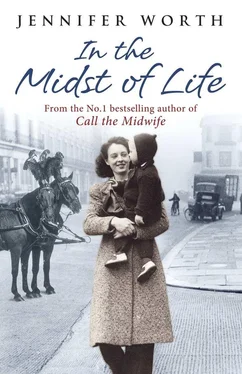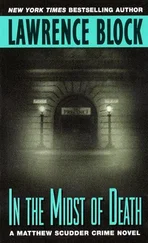Jennifer Worth - In the Midst of Life
Здесь есть возможность читать онлайн «Jennifer Worth - In the Midst of Life» весь текст электронной книги совершенно бесплатно (целиком полную версию без сокращений). В некоторых случаях можно слушать аудио, скачать через торрент в формате fb2 и присутствует краткое содержание. Жанр: Биографии и Мемуары, на английском языке. Описание произведения, (предисловие) а так же отзывы посетителей доступны на портале библиотеки ЛибКат.
- Название:In the Midst of Life
- Автор:
- Жанр:
- Год:неизвестен
- ISBN:нет данных
- Рейтинг книги:3 / 5. Голосов: 1
-
Избранное:Добавить в избранное
- Отзывы:
-
Ваша оценка:
- 60
- 1
- 2
- 3
- 4
- 5
In the Midst of Life: краткое содержание, описание и аннотация
Предлагаем к чтению аннотацию, описание, краткое содержание или предисловие (зависит от того, что написал сам автор книги «In the Midst of Life»). Если вы не нашли необходимую информацию о книге — напишите в комментариях, мы постараемся отыскать её.
In the Midst of Life — читать онлайн бесплатно полную книгу (весь текст) целиком
Ниже представлен текст книги, разбитый по страницам. Система сохранения места последней прочитанной страницы, позволяет с удобством читать онлайн бесплатно книгу «In the Midst of Life», без необходимости каждый раз заново искать на чём Вы остановились. Поставьте закладку, и сможете в любой момент перейти на страницу, на которой закончили чтение.
Интервал:
Закладка:
‘I’m terribly sorry.’ I faltered. ‘That was a dreadful thing to say. Please forgive me.’
He smiled. ‘There is nothing to forgive. It is only natural that the young should follow their instincts and I’m sure I was always hungry when I was your age. Would you like another pudding?’
My cheeks were burning with embarrassment, and I suspected he might be mocking me.
‘No. No, really. But I must go, it’s getting late and I will be on duty at eight o’clock.’
‘Then we will leave together.’
He paid the bill and held my coat for me to slip my arms into.
Over the next six months or so we attended many concerts and recitals together. It was delightful. He introduced me to the rarefied world of chamber music. He obviously had an extensive and detailed knowledge of the subject, and it enhanced my enjoyment if he analysed a quartet before the performance. But he sometimes looked so sad, and once, after a Schubert quintet, he just sat for ages with his head in his hands. The lights had gone up and everyone was moving about. He muttered to me:
‘You go to the bar, Jenny. I will join you in a minute.’
But he didn’t come, and when I returned he was still sitting in exactly the same position, and I knew that he was thinking of his wife and children. My heart ached for him, but there was nothing that I could do or say, so I sat down and took his hand, and he gripped it fiercely. Such depth of suffering and loss cannot be shared; it must be endured alone.
That night Dr Hyem and I travelled back together on the tube and bus. We did not talk much. He was locked in his thoughts and memories, and I did not know what to say. What can you say to someone who has suffered and lost everything? I fell asleep, and was wakened by a voice.
‘Time to wake up. We have reached the Blackwall Tunnel.’
His eyes were smiling as I tried to adjust myself to the waking world and he took my arm to steady me. We stood on the pavement as the bus rumbled off. I looked across the road, and the church clock said a quarter to one.
Just at that moment the clouds parted behind the spire and the moon appeared in all her silver glory. My hair blew across my face.
‘Isn’t that just beautiful,’ I said. ‘Have you ever seen anything more beautiful?’
I stood gazing at the moon, and he was looking at me. Then I suddenly remembered that I would be on duty at eight o’clock.
‘I must go. I’ve got a long day tomorrow.’
I held out my hand to shake his and say goodnight. He took my hand, and then pulled me towards him.
‘Come back with me … Don’t go … Come to my flat.’
I stiffened with surprise.
‘Just for a little while – I need you so.’
I tried to pull back.
‘What do you mean?’
‘You know quite well what I mean.’
He pulled me closer and tried to kiss me, but I didn’t want it, and turned my head away.
‘Don’t turn away! Why did you take my hand in the concert then, if you were going to turn away from me now?’
I should have said, ‘From pity, nothing more, just pity’. But I didn’t. Feebly I said, ‘I don’t know.’
‘Well, I do, so come with me now. Just come. I can’t go on like this. It’s been fifteen years since I’ve known a woman. I shall go mad.’
He pulled me tight to his body and I felt him hard against me.
I tried to pull away.
‘I’ve got to get back to the convent. I will be working in a few hours.’
‘You prissy little convent girl,’ he snarled. ‘You have no understanding of the needs of men.’
‘That’s not fair!’ I shouldn’t have said it, but I added, ‘I just don’t fancy you, that’s all.’
He jumped back as though I had shot him, and a strange, strangled cry came from his throat. I freed myself and, sensing my power, I had the cruelty, not to mention the bad taste, to add, ‘Anyway, you are too old for me.’
I walked away without turning. It was twelve years before I saw Dr Hyem again.
Judith, aged seventeen, died of a brain tumour. Her mother writes:
‘That night, as I prepared for bed, Judith said – “Mom, why don’t you put the light on? It’s getting so dark.”
‘“I can manage, dear,” I replied. I didn’t tell her that the light was on. As usual, I pushed my bed alongside hers and lay on the top in my dressing gown. We held hands, and with a soft pressure on mine she said, “You’ve been a lovely Mum.” Shortly after she drifted into a last sleep and a blessed unconsciousness.
‘During the night Cheyne Stokes breathing took over and, as day broke, I crept into my husband’s room and switched off his alarm clock. He stirred and looked up enquiringly. “You won’t be going to work,” I said. “Judith will die today.”
‘Later in the morning, the rhythm of her breathing changed. Quickly, I knelt beside the bed and slipped my hand into hers. Her fingers curled automatically around mine, like those of a sleeping babe, and she suddenly became so very young and vulnerable, like a creature emerging from a chrysalis into a new life. It was a beauty so fleeting I held my breath in wonder – and in the room there was no breathing at all. The dying need only a hand to hold and a quiet in which to make their departure.’
— from Nurse on Call by Edith Cotterill (Ebury Press, 2009)
1963-64
THE MARIE CURIE HOSPITAL
In the early 1960s, I was ward sister at the Marie Curie Hospital in Hampstead, London. It was part of the Royal Free Hospital, and was reserved for specialised radium treatment. It had originally been built as a cottage hospital around 1900, and was small, consisting of only thirty beds. The hospital was divided into two halves, a twelve-bed ward and three small side wards for the men, and the same for the women. A similar amount of space was occupied by the radiotherapy machines, which were huge, and required a lot of room. We dealt only with radiotherapy – all operations were carried out at the Royal Free. We also had our own dispensary. A matron was in overall charge of the hospital, and I was ward sister in charge of therapeutic cases. I had two staff nurses, five or six student nurses, two ward orderlies, and a ward maid.
Cancer is a word that evokes fear in the minds of most people, and fears linger in the twenty-first century, although medical research has enabled cures for many forms of the disease. In the 1960s, the fear was even more justified. Chemotherapy was still at the research stage; radiotherapy was crude, but sometimes effective; drugs were highly toxic, and frequently created more distress and suffering than the cancer. The most reliable treatment was the surgeon’s knife, but whilst the central growth could frequently be cut away, the secondary tumours often could not be removed, nor could the encroachment into the blood, lymph and skeletal systems be prevented.
Staff nurse and I were preparing Mrs Cox for her third treatment. Heaven knows, it was hopeless, but if the radium could reduce some of the growth, and dry up a little of the exudate from an ulcerated breast that was virtually sloughing away as the malignancy digested her chest wall, it would be worth it for her.
Until the early part of the last century, when mastectomy became a common operation, thousands of women fell victim to the ghastly ‘stinking death’, as this type of cancer was sometimes called. Women afflicted with breast cancer would hide it beneath blouses and shawls, saying nothing. Perhaps a daughter would be let into the secret, but ‘women’s matters’ would be kept strictly away from the men. Very often a husband did not know of his wife’s condition, until the smell of the sticky black exudate became so overwhelming that eventually he noticed, or, reluctantly, his wife confessed. The word ‘confessed’ is used deliberately in this instance, because often women were ashamed of their bodies and even more ashamed if something went wrong. I have seen many a woman with a uterine prolapse hanging down halfway to her knees, yet uttering no complaint. A prolapse was common with multiple childbirths, and one woman had kept hers up with an apple for years, she told us, before she eventually had a pelvic floor repair.
Читать дальшеИнтервал:
Закладка:
Похожие книги на «In the Midst of Life»
Представляем Вашему вниманию похожие книги на «In the Midst of Life» списком для выбора. Мы отобрали схожую по названию и смыслу литературу в надежде предоставить читателям больше вариантов отыскать новые, интересные, ещё непрочитанные произведения.
Обсуждение, отзывы о книге «In the Midst of Life» и просто собственные мнения читателей. Оставьте ваши комментарии, напишите, что Вы думаете о произведении, его смысле или главных героях. Укажите что конкретно понравилось, а что нет, и почему Вы так считаете.












